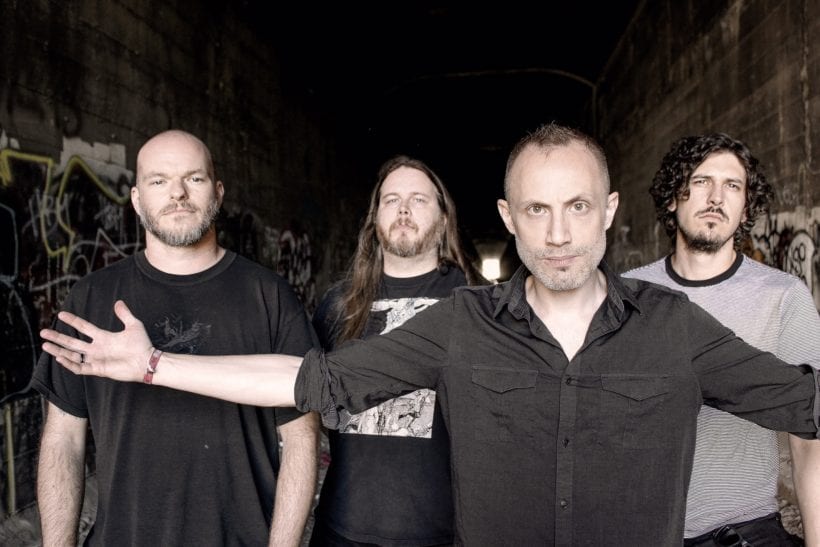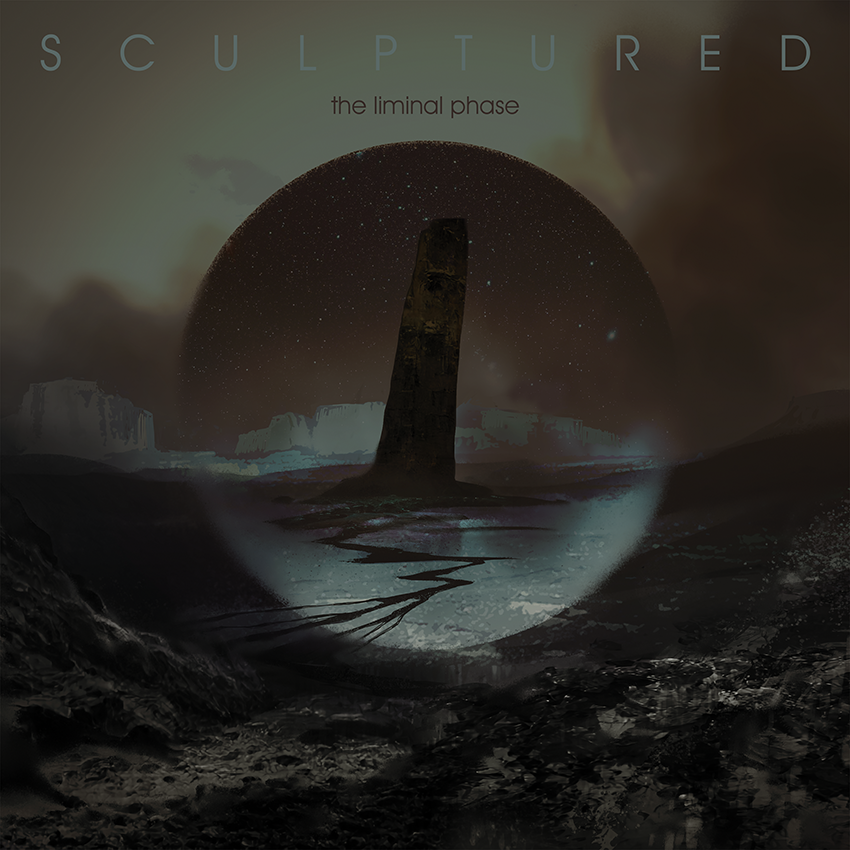
Sculptured has always lived in the shadow of its twin. Having shared members with Agalloch, it could be said that this international progressive metal band was viewed as more of a side project for songwriter Don Anderson (and bassist Jason William Walton, for that matter), and it kind of was. Taking a back seat to Agalloch’s increasing popularity up until the band’s demise in 2016, Sculptured—Anderson’s main vehicle for self-expression—went into hibernation, but this wasn’t new. With an eight year gap between 2000’s Apollo Ends and the subsequent Embodiment, it’s no surprise that Sculptured would take over a decade to re-emerge, but Anderson works at his own pace.
Thirteen years after Embodiment and unencumbered by Agalloch’s presence, Sculptured returns to the spotlight with The Liminal Phase, and with a new album comes a new about-face in sound. From The Spear of the Lily is Aureoled‘s progressive take on dark melodic death metal, to Apollo Ends‘ even more adventurous departure from death metal, to Embodiment‘s embracing of atonal death metal’s tenets, Sculptured changing sound and adapting over time is a notable reality for this band, and The Liminal Phase is no different.
While its predecessors could be seen as progressive rock albums just as much as their metal counterparts, The Liminal Phase‘s more outright metalisms—driving double-bass drumming and big, chugging riffs, especially—reflect both a new era and a new lineup for this long-standing project. Now featuring newcomers Marius Sjøli (vocals) and Martti Hill (drums) to accompany returning member Andy Winter (keyboards) and the core lineup of Anderson and Walton, Anderson prefers to take a back seat to let his fellow bandmates flourish. Eschewing control, Sculptured’s primary songwriter prefers to let his band be a vehicle for his bandmates’ musical personalities and ideas, resulting in a duality of Sjøli’s calm, hushed voice and Hill’s powerful percussive presence. Walton’s own mixing, which gives The Liminal Phase a miasmic, larger-than-life quality, really drives the point home: Sculptured are talented individuals making memorable, complex music which sets itself aside from “prog metal'”s glut. Presenting a more human take on the style, Sculptured’s uniquely emotive new album transcends “prog” and positions itself as something truly progressive. Watch an exclusive video debut of album opener “The Ordeal of Undecidability” and read an interview with Don Anderson below.
Though the wait between Apollo Ends and Embodiment shows that Sculptured works at its own pace, the 13 year silence which falls between Embodiment and The Liminal Phase made many wonder if Sculptured was still active. Was there anything going on behind the scenes? What made you want to bring Sculptured back after such a long hiatus?
Well, all my other bands broke up! But, seriously, I’ve had ideas going since 2010. But, it wasn’t till after Agalloch broke up in 2016 that I really dug in and wrapped the main songwriting. The attention I was able to give Sculptured was ultimately determined by the attention I had to give Agalloch and my academic career. Agalloch began touring more regularly around 2010 and I was wrapping up grad school and beginning to go on the academic job market at the same time. I always had ideas flowing, but putting together a new lineup more or less and working on the kinks of recording long distance seemed daunting. Honestly, I was enjoying the success of Agalloch and felt I should put most of my musical focus there since things were really growing with the band. I do feel a little bit bad that I neglected my own project, but I also considered Agalloch to be just as much a part of myself as Sculptured. So, as long as I was doing any kind of music I was content.
The Liminal Phase is still centered around three core members who performed on Embodiment (Andy Winter on keyboards, Jason William Walton on bass, and yourself handling guitars and vocals), but Sculptured is now joined by Formloff’s Marius Sjøli on guitars/lead vocals and Barrowlands’ Martti Hill on drums. What was it like opening up your musical world to more people this time around?
It was great. I love working with new people and encouraging them to exercise total freedom with what they do. I don’t ask for anything specific from any of the musicians I work with—in fact, it’s really a fundamental work ethic of mine not to interfere in any way. If we’re working together, that means I trust you and I’m confident that you will do the best you can do with your instrument. For example, when I asked Jo Quail to do some cello for me, I simply said “please play cello at this part of the song.” She’s brilliant and I don’t want to get in the way of her talent. That’s how I work with all of these folks. My favorite story that best sums this up is the time when Dave Murray recorded drums for Embodiment. I didn’t hear the final and finished drum tracks—what is on the album—until they were permanently done. No demos, nothing. It was great. Imagine my surprise when I did hear them! That’s magic to me. I love surprises and would prefer not to have any control over anyone I work with in order to make the process all about the potential for surprises and happy accidents.
I understand Martti tracked his drums back in 2017. How much time did you spend composing and recording The Liminal Phase?
Since all of us record from home it’s really a little here and a little there. I would say the last 3 years or so is where the bulk of the main recording happened. The composing could go back as far as 2010.
Do you feel the “Matrix Metal” tag still applies to Sculptured in the The Liminal Phase era?
Not at all. I didn’t use any serial techniques this time around. I began using matrices for Embodiment because I wanted to force myself out of deeply ingrained patterns, melodies, and chords. Every instrumentalist struggles with this. You get used to doing the same licks and relying on the same chords for riffs. You can of course learn new scales and chords, but even then, it’s very easy to unconsciously fall back on old habits. So, using serialism by composing with matrices catapulted me out of tonality, key signatures, standard chords, and melody. Not every riff was written that way—that would have been overkill. But, even now I find Embodiment really, really dissonant and atonal. I love it, but I think once I got that out of my system I was able to return to tonality and begin writing in regular key signatures again. I felt refreshed. I’m writing new music already and I’ve returned to a few of those serial techniques, but so far it’s much more balanced. It’s just another compositional tool at this point.
What does Sculptured mean to you now?
As I get older, I take stock of those things that have been with me nearly my whole life. I started playing guitar at 9 years old. I started Sculptured when I was 15. Now, I’m 42. Of course, it hasn’t been a consistent project, but I often think of my 15 year old self and telling him, “hey, I’m still doing this thing.” It’s very rewarding and brings a deep and existential continuity to my life.
The latest Sculptured bio highlights Sculptured and Agalloch coexisting during the Apollo Ends (2000) and Pale Folklore (1999) days, the former essentially absorbing the latter with added members at that time. What is your musical experience with your bandmate Jason Walton like within the Sculptured lens? Does it differ from the way you interacted as members of Agalloch?
That’s a great question. First, there is a very special connection between Jason, John, and myself. Obviously we’ve had our ups and downs. But, those very early times were crazy. We would rehearse Pale Folklore and then turn around and rehearse Sculptured. We compared it to a car and when it was John driving, we were Agalloch. When it was me driving, we were Sculptured. But, regarding Jason in particular, he’s been my closest musical collaborator for my whole life. He moved out from Minnesota to live with me for 6 months to join Sculptured—not Agalloch. Agalloch came later. So, he and I initially connected through the Sculptured demo from 1996. He then lived with me when I was still in my parents’ house. We spent all our days listening to and writing music. I think he best understands me and Sculptured better than anyone else. He’s my best friend and is the sort of musician where we don’t have to talk about what we are doing musically—we just do it. I can’t imagine Sculptured, or honestly, my life without him.
In terms of playing with him in Agalloch, that was more of me being in a band with one of my best friends. But, with Sculptured he really is a fundamental member and I see Sculptured as Jason and I at its very core.
The Liminal Phase features a heavier and more overtly metallic Sculptured when compared to the material which precedes it. What inspired you to make such an aggressive album?
I think we were just lucky with the guitar tones and Jason did a brilliant and meticulous job with the mix. I used my Gibson Les Paul and SG through my Marshall JCM 900. I’m definitely of the opinion that the classics are a classic for a reason. I don’t like to mess with my rhythm tone at all. You are hearing a pure Gibson/Marshall tone on this record. I think bands can get too hung up on searching for a perfect tone. Tone comes from your hands first, and then your guitar and amp. I really believe you don’t need anything else. Again, it’s about not getting in the way of the magic.
Marius Sjøli’s voice proves to be a more laid-back (but still emotive) alternative to what would normally be a very bombastic performance in what would classically be considered progressive metal. Though previous Sculptured albums featured alternative takes on the progressive metal vocal format, what led to using this vocal style, and was this under your guidance?
In the beginning, Sculptured was a death metal band with some clean vocals. I knew I wanted clean vocals from the start because they are too dynamic and emotive to completely forego if you are already writing melodic metal. But, I definitely didn’t want “metal” vocals—I just wanted a regular voice. My point of reference was Dan Swanö. That led to me asking my friend in jazz choir at the time, Brian Yager. Marius to me just has a natural and beautiful voice. He’s also a longtime friend of Jason’s and mine. So, he was a clear choice. I gave him zero guidance. He’s a natural songwriter and vocal arranger. I couldn’t have done what he did. He really made the record for me.
This is the first time you didn’t contribute to a Sculptured album lyrically. As Sculptured is primarily your project, what was it like giving up that element of control? How did this affect your songwriting?
I loved it! Again, I hate control. I always say that artists are the worst thing to happen to art. So many artists let their egos, desires, or expectations get in the way of what’s actually coming out of the speakers. So, I knew if Marius was going to do his own thing, he should use his own lyrics. I had written some lyrics already, so we kept those, but otherwise I encouraged him to do his own thing. The only thing I did was send him some pictures and a few quotes from influential philosophers for inspiration. That way he was sort of thematically on the same wavelength. But, even that is a cool indirect way of communicating—through images and quotes.
With so much time now separating us from Sculptured’s previous three albums, how do you view them in hindsight? Do you have a favorite?
I know other bands say this, but my favorite is the one I’m writing now. And I’m incredibly lucky and fortunate to be able to say that. I’m proud of all the albums and even if there are aspects I would never repeat now, those albums are a snapshot of where I was musically.
The Liminal Phase releases August 27th on BMG.







